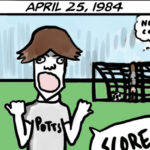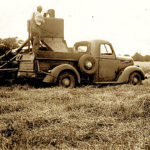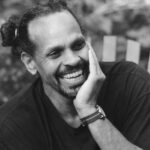Carl Hoffman is the author of The Lunatic Express: Discovering the World . . . via Its Most Dangerous Buses, Boats, Trains, and Planes. A contributing editor at National Geographic Traveler, Wired, and Popular Mechanics magazines, his stories about travel, adventure and technology – and often the nexus between them — have also appeared in Outside, Men’s Journal, National Geographic Adventure and Smithsonian. His reporting has taken him to 65 countries, where he’s flown with missionaries in Irian Jaya and mercenary bush pilots in the Congo and south Sudan, ridden reindeer in Siberia, eaten parrot in Borneo, driven the Baja 1,000 and once sailed a 16-foot open racing dingy 250 miles. He has won four Lowell Thomas Awards from the Society of American Travel Writers. His previous book is Hunting Warbirds: The Obsessive Quest for the Lost Aircraft of World War II
.
How did you get started traveling?
My first adventures took place in the pages of books. I loved books with maps and I devoured Arthur Ransome’s Swallows and Amazons, about children who discover a sailboat and an island on the lake they’re visiting over the holidays: “With a lake as big as a small sea, a fourteen-foot dingy waiting in the boathouse, and the little wooded island waiting for explorers, nothing but a sailing voyage of discovery seemed worth thinking about.” That line captures the birth of wanderlust better than any I’ve read since. I gobbled up adventure tales and novels with a strong sense of place, from T.E. Lawrence to Wilfred Thesiger to War and Peace to literary journalism. When I finished college I backpacked around the world for seven months and the world in my head matched the world in reality; I was smitten, especially with chaotic, sensual places that challenged me. I wanted to see more, to smell more, to taste more, to know more.
How did you get started writing?
I was raised in a family of readers; my father was a newspaper editor and my mother a children’s librarian, and to be a writer was the greatest accomplishment I could imagine. My mother fed me novels and my father fed me the great narrative journalists like John McPhee and John Hersey; writing is all I ever wanted to do. During that first trip around the world I kept a journal and wrote letters to my family and everyone liked them; I got home and just started writing stories and selling them to newspaper travel sections.
What do you consider your first “break” as a writer?
I pitched Islands magazine for years about exotic destinations and finally sent the editor an idea about a place that was the opposite of the classic island paradise — a flat, marshy, buggy, hot island in the Chesapeake Bay inhabited by a few hundred watermen; the editor said she’d look at it on spec, so I went for a week, wrote a piece that she loved, and it won a Lowell Thomas Award soon after. Next thing I knew, she sent me to the Canary Islands for two weeks.
As a traveler and fact/story gatherer, what is your biggest challenge on the road?
To push ever deeper; to report and to find the pulse of a place through its stories and characters. I don’t consider myself a travel writer so much as a journalist, and the best travel writing is good story-telling mixed with in-depth reporting. I want to know why things are the way they are, and to do that you have to connect with people and drill into their lives. For Lunatic I spent hours riding mini buses in Nairobi with a driver and his tout, and went to their homes after. I didn’t just ride the same ferry route that killed 1,800 people off the coast of Senegal; I found a survivor who could tell the tale. In Mumbai I traveled with a former street thug who not only had a fascinating take on riding its commuter trains, but took me to the mortuary of a hospital where many of the trains’ victims end up. Sometimes it’s exhausting, but I find I have to keep pushing and digging deeper all the time. And when I do, the best jewels are found.
What is your biggest challenge in the research and writing process?
I find writing difficult. No words ever come easy; it’s just a slow and patient grind that feels almost physical to me and I force myself to sit at my computer from eight or so in the morning until five or six at night, day after day after day. And in Lunatic I write about loneliness and the end of my marriage and that was difficult; I found it hard to strike the right balance between saying enough and not too much. Also, of course, it’s hard on your family and social life to be away so much — it separates you from everyone in the nine to five world.
What is your biggest challenge from a business standpoint? Editors? Finances? Promotion?
The great challenge is always finding the right stories. Not topics, or interesting places, but stories that embody a place and have a great narrative and that no one’s ever really told before. As long as I can find those, I can keep the work flowing in and the bills paid.
Have you ever done other work to make ends meet?
When I first started out I decided I wanted to make my living from writing only; I spent the first three years working construction to get started, but for the past 25 years I’ve never had a job. It’s a passion and if you’re not willing to give it everything than you can’t do it. You have to be willing to sacrifice, to live meagerly at first, in order to have the time to write and pitch full time.
What travel authors or books might you recommend and/or have influenced you?
I love so many: Tobias Schneebaum, a gay New York artist and wonderful writer who walked naked into the Amazon in the 50s and then went to live with the Asmat on the Indonesian half of New Guinea, and wrote two books: Keep the River on Your Right and Where the Spirits Dwell. He writes about the conflict between feeling different and searching for a sense of belonging in the exotic, which is something I think about a lot. Norman Mailer said Schneebaum was both the most timid and most fearless person he’d ever met. When I was younger I loved Thesiger’s Arabian Sands and T.E. Lawrence; again, I love tales about people who feel like outsiders in their own cultures and seek the connection they lack at home in the far away – it’s a theme in Lunatic – and of course they find it only for a time and then always have to return ‘home;’ you can never escape who you really are. And I like Lawrence Osborne and Tony Horwitz, fine writers who are also good journalists evoking both a sense of place and history.
What advice and/or warnings would you give to someone who is considering going into travel writing?
To not forget the importance of reporting. It’s not enough just to travel, to move, to be somewhere — you have to ask questions. I don’t think anyone should aim to be a travel writer; they should strive to be a good journalist, first; a great writer can write about anything.
What is the biggest reward of life as a travel writer?
To subsume myself in otherness for a time; to have a license to ask questions and burrow into people’s lives is a great privilege. To get to leave on a new adventure. And then to come home again. You can’t have one without the other.





